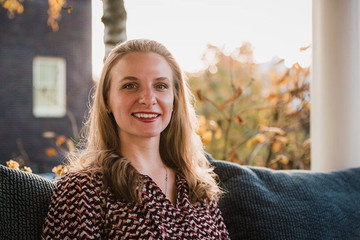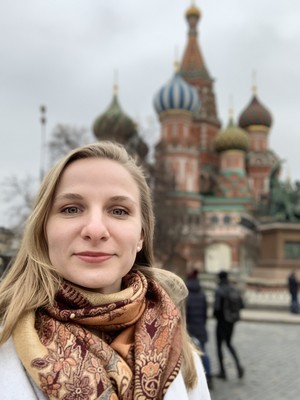
04/10/2020
Liza Kotar M ’19 moved to Moscow, Russia in January to teach psychology classes in English to master’s-level university students and begin her research on individual resilience.
She recently learned that she has received a Fulbright Research Award for research and advanced studies in collaboration with Professor Nikita Pokrovsky, chair of the General Sociology Department at the Higher School of Economics in Moscow.
Kotar, who is hoping to start her research later this year, plans to examine how Russians react to the stress and trauma of the novel coronavirus (COVID-19) pandemic, compare it to the American response, and also develop steps for how communities can better operate by making individuals more resilient. She had submitted her proposal before the pandemic began, but she will use this crisis to help us better understand an important mental health topic.
It’s the latest ambitious academic project for Kotar, who completed her master’s in therapeutic recreation completely online from her home in Seattle, Washington, and has never set foot on the SUNY Cortland campus.
Individual resiliency has been studied previously in Russia, which underwent tremendous turmoil throughout the 20th century, from world wars to the Russian Revolution of 1917 and the rise and fall of the Soviet Union.
Those events have conditioned Russians to behave differently than Americans when faced with significant stressors. That is of personal interest to Kotar, a Russian-American.

“I was really interested in resilience because Russians have gone through so much trauma in their recent history, and my family hadn’t witnessed the changes in Russia since before the revolution,” Kotar said. “We left before the (1917) revolution, so as a result, I’m third generation growing up in America. Growing up in a Russian community in America, I was always really interested in understanding how Russian resilience differed from American resilience. I’ve noticed that for better or for worse, Russians know that resilience is a habit, because they have recently been through national turmoil when the Communist regime ended in the 90s.
“Americans have a different spin on resilience because they’ve created an industrious, bustling nation. However, the way they’re dealing with this crisis is very different than Russia.”
Individual resilience is a growing topic in health and human services. It explores how individuals adapt to adversity, what strategies are most useful and why people react in different ways under the same circumstances. Resilience development has become a go-to method for therapists and can also be an asset for communities and organizations.
Kotar is hoping that her research in part creates a common language between Americans and Russians, shifts perspectives and ultimately bolsters relations between the two nations. She plans to use a mixed methodology of interviews and an examination of statistical and economic data to conduct her Fulbright research.
The second part of her research will be to develop workshops, lectures and events to help others understand her initial findings. Kotar aims to work with communities and organizations in Russia to unpack the response to COVID-19 and examine what strategies had the best effect on the mental health of individuals.
“My guess is from my research so far – and this is a loose hypothesis – Russians tend to have a more internally focused resilience,” she said. “They tend to reformat their inner world much more quickly than Americans would. Americans, on the other hand, are much more adept at learning how to affect the outer system. This is what I call ‘externally focused resilience'. They feel confident that they can make an impact on the outer world through their individual efforts.”
Kotar is appreciative of the advice she’s gotten from SUNY Distinguished Service Professor Lynn Anderson of the Recreation, Parks and Leisure Studies Department as she went through the Fulbright application process.
“With her academic preparation in therapeutic recreation, Liza is uniquely situated to study resilience in individuals and communities,” Anderson said. “The foundation of the field of therapeutic recreation is to help people build on strengths to flourish in times of stress and adversity. The field has developed approaches that assist people in experiencing not only resilience, but post-traumatic growth. Liza’s project will be an interesting investigation of cultural differences, which are important for all helping professionals to understand.”
Kotar enjoyed studying for her master’s online. Although it provided its own set of challenges, it allowed her to work and travel at the same time.
“I think right now universities are designing those platforms to be more interactive,” Kotar said. “I can’t say it was perfect but if you are proactive and self-disciplined, you can make a lot out of it. You can take on different jobs and projects and be creative in the way you deliver your content. You have a lot of flexibility in your life to travel, so there are a lot of positive takeaways.”
While she has never been to Cortland, Kotar is glad to call herself a Red Dragon thanks to the effort of faculty like Anderson, who helped make her distance learning work so smoothly.
“I have so much gratitude for SUNY Cortland,” she said. “They have been very supportive. Both President (Erik J.) Bitterbaum and Dr. Anderson were very helpful in the development of this project. SUNY Cortland has been very supportive and quick to answer any questions I may have had. It’s a great place to go to school."